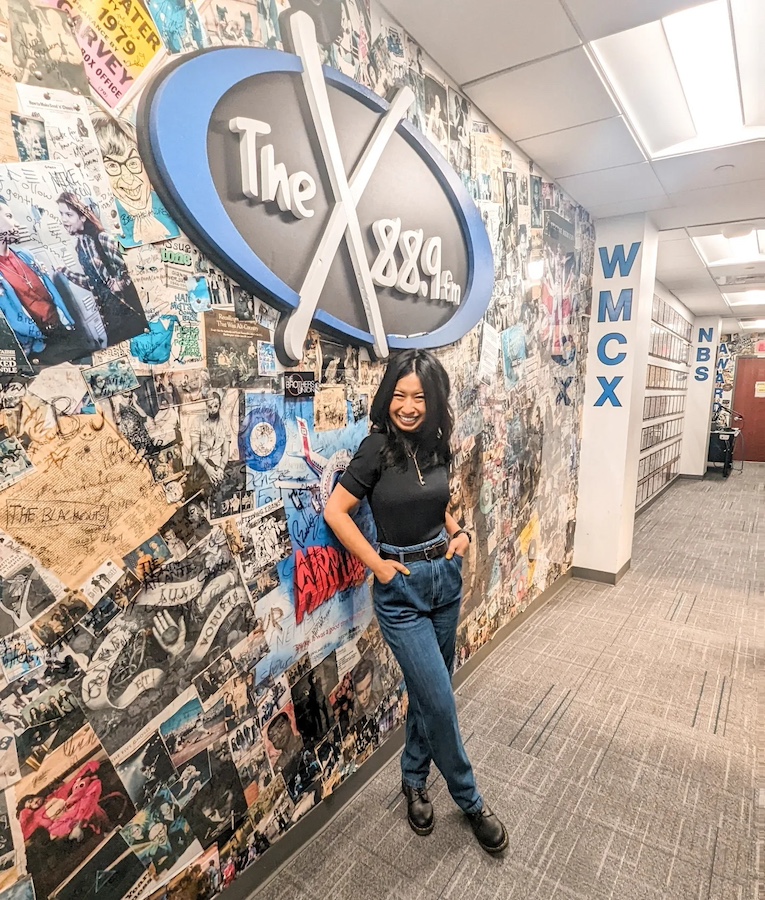Except where noted, all photos are from Veronica Rajadnya’s personal collection of memories, music, and Monmouth station days. She’s the best. College radio is the best. New Jersey is the best.
Like music, college radio is big in New Jersey. For decades, stations like WRSU (Rutgers), WSOU (Seton Hall), WBJB (Brookdale), and WBZC (formerly Burlington County at Rowan, which won me many free concert tickets before it was bought out by Christian formatting) have rocked local (and now global, with streaming) airwaves with up-and-coming bands, music news, and stories not seen (or, heard) anywhere else. Flanked by two of the biggest media markets in the world, New Jersey not only has the equipment and reference for quality, but talent in young people – for career and at heart – on a mission to connect, and turn you on to your next favorite song.
College radio is largely non-commercial, which means unsigned and emerging bands, young people’s political opinions, and next-gen pop culture references (otherwise repellant to stockholders) are welcome and requested by college radio stations, regulated by the FCC, the guidance of faculty advisors (often radio-people themselves), and reverent use of the “Dump” button… #iykyk.
Down the Jersey Shore, one of the best (I may be biased…), WMCX, is having a birthday. The home to the Bruce Springsteen Archives and Center for American Music and a skip from legendary Jersey venues like The Stone Pony, Asbury Lanes, and Starland Ballroom, my alma mater, Monmouth University and its college radio station have launched many a broadcast career, hosted big and at-the-time young bands, been among the first media outlets to break major stories (like the news of Bob Marley’s passing in 1981), and much more. Today we X’ers (me included) celebrate 50 years of ‘Modern Rock with an Edge’ with an anniversary party at the WMCX on-air studio, and here a retrospective from over a dozen X’ers who share their part in its story.
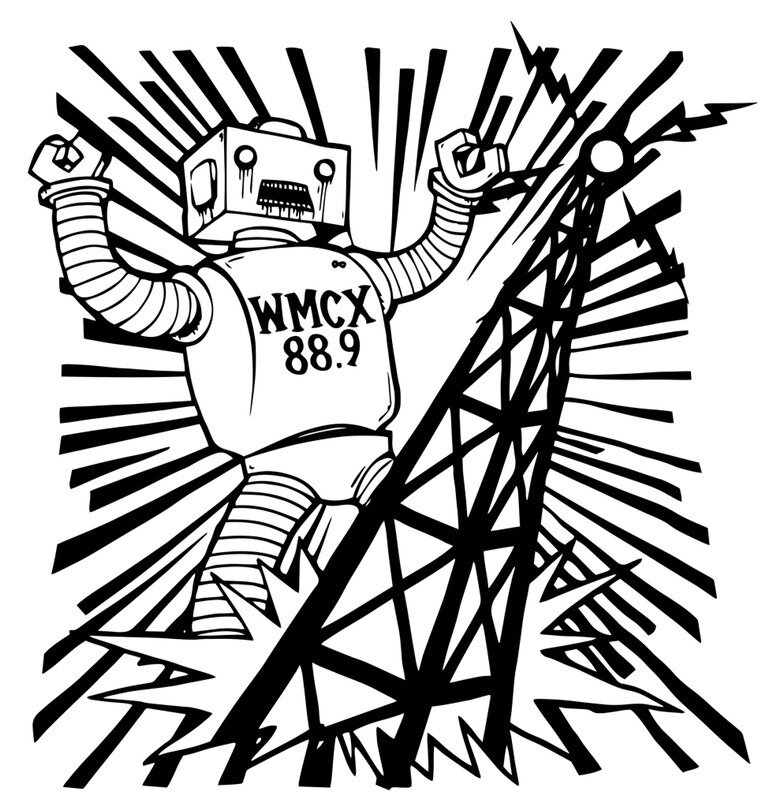
From intern to In the Morning with Intern Anthony
Host of SiriusXM’s PopRocks and the eponymous variety and talk show “Karen Carson in The Morning” on New York’s Hot AC (adult contemporary) station WNEW 102.7, Karen Carson interviews celebrities (Jason Derulo, Michael Bublé, Bono and Larry Mullins of U2, and Lady Gaga are among highlights), invites listeners to “beat” her in pop culture trivia (they rarely do), and, with her co-hosts, comedians Johnny Minge and “Intern” Anthony Malerba, is a friend to thousands.
But when they were in school at then-Monmouth College, they were Promotions Director at WMCX, talking to record labels for bands to put on and working with Stone Pony and Fast Lane to host events (“I still talk to the guys that ran both bars today; it was fun”). They got into the music scene in Long Branch (“such a beautiful town now – it wasn’t then”) and did live club DJing for heavy metal at Murphy’s Law, “which isn’t there anymore.” Carson credits Professor Evertt “Rett” Rich (aka PR), WMCX’s first faculty advisor, with the experience that helped launch them into their postgraduate career.
He’s the greatest thing that ever happened to me. He’s a tough guy. I had to convince him for an internship there. So, when everybody went home for winter break, he needed somebody on the radio station every day. It wasn’t long (mid-days 10 to noon), but because he granted me that internship, I got to be on the air every single day. And when you are on the air every single day, everything changes. Your whole style changes. You become more confident. You’re like, ‘Wait a minute. I think I can do this now.’ That changed everything. And then, just being on the air more and more at WMCX, I got hired at 107.1 in Long Branch. It was a rock station then. I got hired before I graduated, because they heard me on the air at WMCX. So that’s how it really helped me get in the door.”
When WMCX launched in 1974, the station was at 10 watts, then 13 watts, which for reference takes the hearing signal as far as the parking lot, but following a 1984 studio fire, the radio station was rebuilt, re-powered to 1000 watts, and rebranded from the original WMCJ 88.1 to WMCX 88.9 (which has a better ring, I think).
At first, [the most challenging part] getting over the fear of talking into the microphone! [Laughs] I mean, when I started, I think for one year it was 13 watts and everybody used to calm each other down by saying, ‘Don’t worry, no one can hear you. It only goes to the end of the parking lot.’ [Laughs] That would get rid of your nerves. Then it went to 1000 watts. I was there when they upgraded, but by that time, I had felt more comfortable, you know, and listening to your friends do it gives you confidence. Listening to the other DJ’s and people there. It’s great. It was great…”
Carson – whose illustrious career post-WMCX spans formats, from Hot AC to oldies, then love songs, classic rock in Hawaii, back to NYC with soft AC, and today’s gig taking to Lady Gaga about her family while she was filming A Star is Born (“I’ve been everywhere!”) – advises broadcast and media hopefuls to try something, “even if it’s not exactly what you want. Try it. Just get your foot in the door, learn the people, learn the roles,” noting how special college radio is.
College radio is a place to take risks both with the music and the post. That’s where you learn. Once you leave college, you don’t get to choose the music… ever. It’s a big business, big business, and it’s all researched and figured out. So, I loved the freedom, I think, and college kids know a lot more than most of the news people around, you know; they just have their finger on it.”
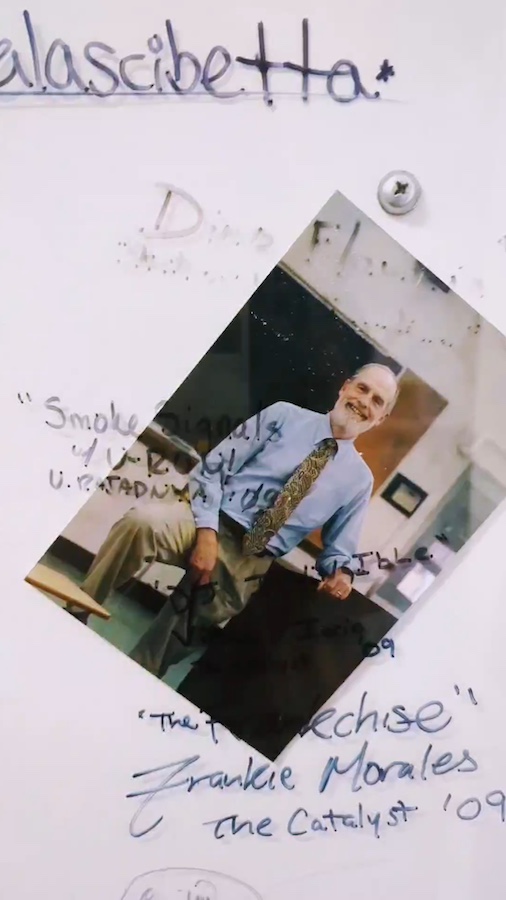
Making connections & faking it ’til you make it
Internships are another essential avenue for first-hand experience, which Jeff Smith, Class of “the last year of Monmouth College”) explained are harder and harder to get, even rare post-COVID (due to the “great intern lawsuit of several years ago”), which (looking back) made college radio that much more important and an essential place of learning and connections. Smith is the manager of syndicated engineering at iHeartRadio and Premiere networks “responsible for the tech side of all the operations that go on in New York, both in their radio and all their syndicated shows, like Elvis Duran and the Morning Show, The Breakfast Club, iHeartRadio Music Festival, iHeartCountry Festival, all that kind of stuff, making sure that that all gets on the air.”
The late, great Chris Cavallaro [local radio producer and audio engineer turned advisor to WMCX and the college TV station Hawk TV and the MU chapter of the National Broadcasting Society] and Cosmo Rose [career radio announcer, news anchor, and adjunct professor of broadcasting at Monmouth] encouraged me so much. My junior year, I guess, they wanted for a remote engineer to handle the high school football and basketball games and told me about it. I said, ‘I know nothing about that.’ They both told me, ‘You know enough! Lie about it and just fake it till you make it.’ I got the job and that turned into my first full time job two days after I graduated Monmouth. That’s 30 years ago, full time, but doing broadcast engineering for about 32 years. If it wasn’t for them and Professor Rich encouraging me in my junior year to go out and try and take this remote job, who knows what I would have done.
I always loved radio because radio is such a big thing. I mean, I grew up in the seventies and the eighties. I can remember sitting in front of a radio at home and waiting for a request I made to come on. I loved radio, more than TV or anything else like that. I knew I wanted to do it. I went to Monmouth because it was local, both my parents had gone, and they had a radio station. I went in undeclared, talked to advisors who said, “Check out the third floor of the Student Center. There’s WMCX, there’s The Outlook [newspaper].” And I went in pretty gung-ho as an 18 year old thinking, ‘I’m going to do everything and I know everything.’ I quickly got put in my place by Chris and PR and was told, ‘No, there’s a there’s a way to do this and there’re things you need to do first…’X’ers
I eventually gained Chris Cavallaro’s confidence and he let me help out. I came up with different ways to make the broadcast work from the remote site and kind of changed a lot of it. Much to Chris is chagrin at the time because I here I was, 20 years old at the time, but he encouraged me ultimately to go do this professionally, so I spent a lot of time – as I’m sure most WMCX people still do – at that radio station just existing there, between there and The Outlook, on the third floor of the student center. All my friends were there. It was my whole existence.
In the early 2000s, Smith was working for a company that was building new studios for WJLK [94.3 The Point] and other radio stations on the Jersey Shore. One day, Chris and PR called them up and said they were building a new radio studio and moving out of the student center because they received an endowment from the late Jules L. Plangere of the Asbury Park Press and Trustee Emeritus of Monmouth University. “The Plangere Center studios are basically an exact copy of what WJLK studio are today!”
Chris convinced me to come back and be an adjunct and teach radio production there, and that was a lot of fun… You know, I work with people that I had in class back then at iHeart now, which is funny… you never know where connections are going to be made.”
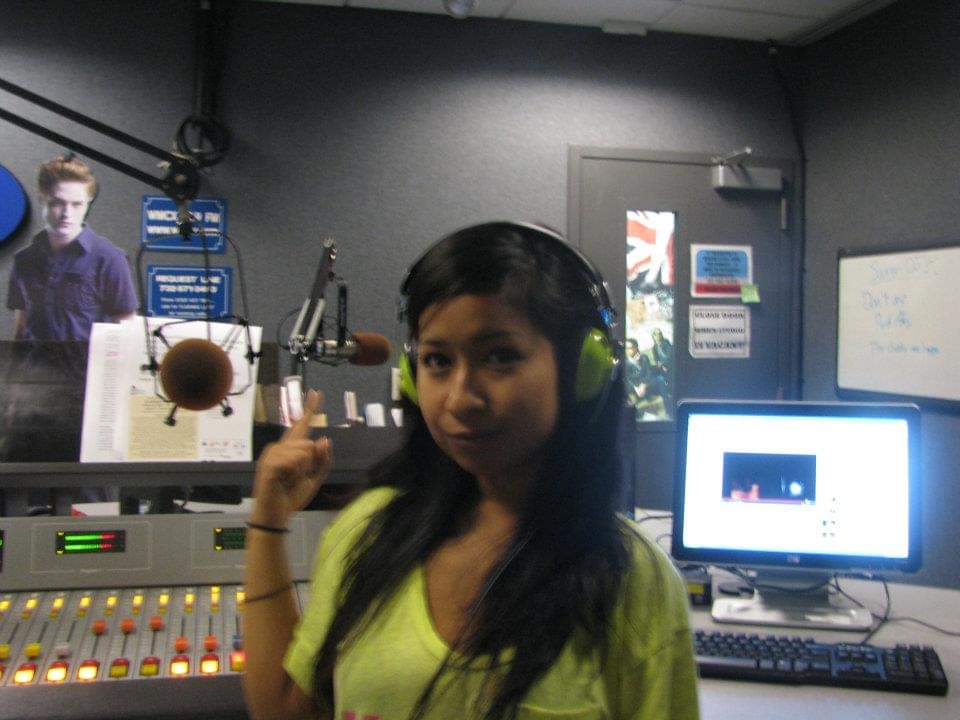
Passion playing on the radio
When I get on Zoom with Professor Aaron Furgason, former Atlantic Records executive, radio veteran, and my WMCX faculty advisor who took over the post from PR in 2005, they needed to get in their hearing aid in “because they are going deaf.” They grew up in Edison, New Jersey, which is near my own hometown of Woodbridge, and listened to WSOU as a kid (“Metallica, Slayer, Anthrax…it was the gateway to my deafness, probably”), as I did. All to say that college radio was in their life long before they were a student at Monmouth College and WMCX, where they were the Music Director and had three different radio shows.
One was a morning show, one was an interview show with Jill Cohen, who works at Columbia Records now, and then I had a Sunday night heavy metal show with one of my college roommates – Mike Crudello. I was on the air a lot. We interviewed a lot of local bands, some that ended up getting signed to labels. We interviewed the Spin Doctors literally right before they became huge, back in the early nineties. It was an endless amount of fun time had at WMCX.”
Furgason’s role at WMCX includes motivating students to do things like classroom concerts, 24-Hour Music Festivals, interviews, homecoming events, sporting events, and making demo tapes as applications for on-air talent, and to “make sure they don’t get in trouble with the Federal Communications Commission [and that] all of the rules that the government has put in place for non-commercial radio are followed.” Key differences between when they were a student and what students experience now range from the technology to the music itself. But a few things remain, blessedly, the same.
They don’t have to queue albums or put carts in. They just have to press the touch screen to add 1 of 60,000 songs, which is the WMCX library, from A-ha to [Frank] Zappa, where in my generation you were fucked when the record was taken by somebody; the record you really want to play has suddenly disappeared or the cart was changed in some way so. It’s certainly much more tech friendly today. I almost universally brought my own collection with me to the shows, but you know, students do that same thing today. They bring in their phone or their computer to play stuff, so it’s really no different. It’s just that it’s much easier for to transport than mine was. Mine was in a milk crate. Theirs is in a little book bag, or in their hand, or in their pocket.
We asked: What role does college radio, non-commercial stations largely un-beholden to shareholders, but really and truly heard by millions of people a year, have in broadcasting, the music industry, and New Jersey in general?
I’ve seen a lot of concerts; I just saw a band on Tuesday night of this week called I Don’t Know How But They Found Me, which of course is a reference from Back to the Future, and that show has slid into my top five shows of all time. A band that was just simply remarkable and 30 years ago would be in at arena the next time I saw them, but because we’re in that world where everybody has access to everything, I think what a great college radio station does is it curate [music] for people. You know, we’re a punk, new wave, alternative, some hip-hop, some classic Zappa, Nick Drake station. These things aren’t normally played anywhere else.
We have been really supportive of the local music scene and have had a lot of really talented great artists come through that in this day and age should be much bigger than they are. Camp Cope – they’re from Australia. I believe we’ve had Screaming Females who are a pretty popular band. We’ve had Jeff Rosenstock through the room.
Scott Stapp [of Creed] was there. We had Chris Lord and Phil Miller, who are directors of everything from The Lego Batman Movie. All Time Low, way, way back when. At some point Panic! At the Disco and The North Atlantic. A lot of bands that were up and coming at the time they stopped by WMCX.
“And we are that location; I think every great college radio station is that location where real music lovers can find not only the things that they’ve loved their whole life, but also things that are moving music forward. Ultimately, that’s probably the real role I think every non-commercial station should do… it doesn’t have to worry about making stockholders happy, so it should make audiences happy.
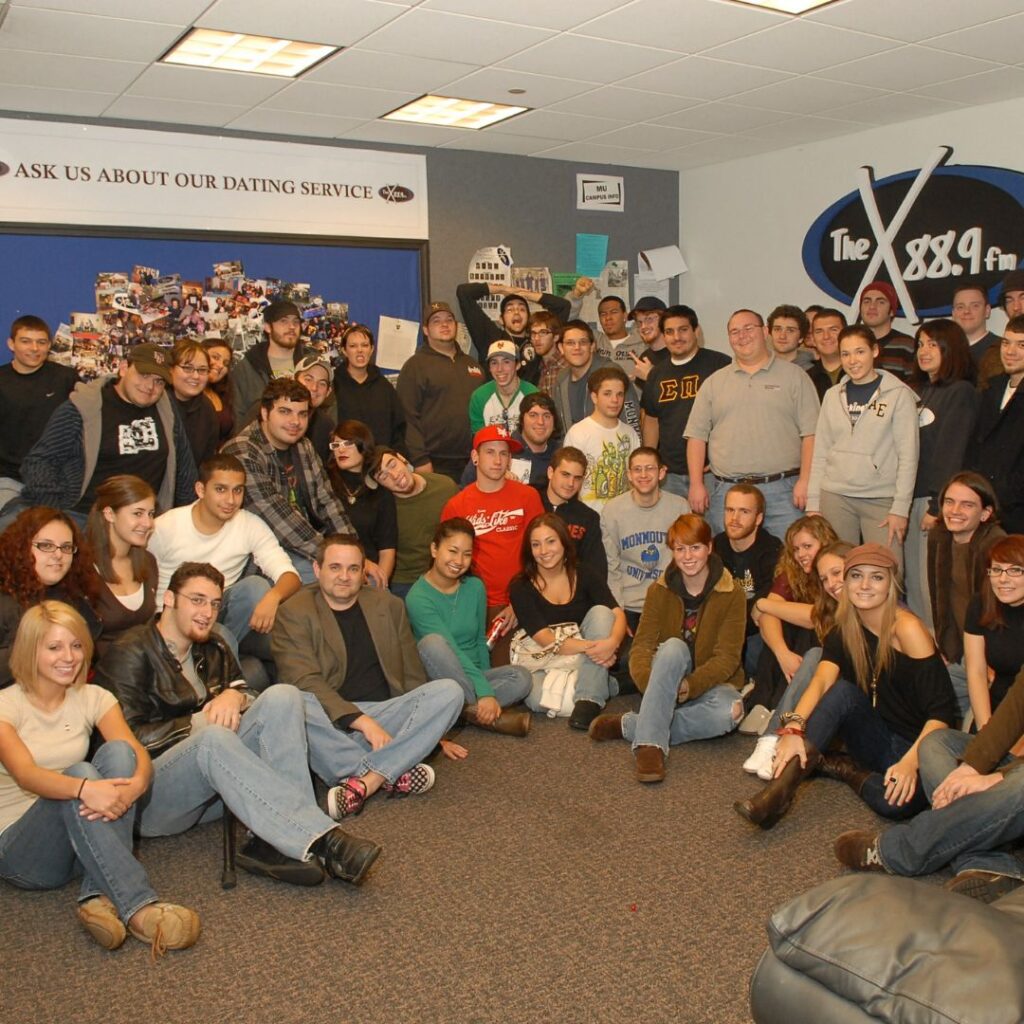
To prepare students for careers in broadcasting and other storytelling paths, Furgason collaborates with other colleagues with in-field experience including Professor Eric Reisher (another former WMCX Program Director-turned engineer) and Professor Nick Messina and Professor Matt Harmon, who both have strength in voice over work and are respectively an audio production specialist and a broadcaster for the New York] Red Bulls. WMCX is starting to work on a space for podcasting, and other departments collaborate with the station; there’s a business show, an award-winning world language show, and Blue Hawk Records, the record label for the university which has a show every every week and is led by Professor Joe Rapolla, who worked for Warner Music Group.
I think the main difference from student radio to commercial is that there’s such a passion for what they’re playing and talking about because that’s what they love, and I think that gets out. I also think that we are probably the last place that people can really go in and be interviewed and play unsigned music that, hopefully, whether it gets anywhere bigger, is still being put out to the world and [could] latch onto somebody. Plus, we’re between New York, you know? That’s the other cool thing. We’re between New York and Philly, so they’re always driving through on I-95, so getting them to stop or tune in is not as hard as people think.
Then what is the future of radio?
It’s one of the first times in my lifetime that I really don’t know. I think commercial radio really needs to reevaluate what they do in every market. As a kid growing up, the DJ’s could kind of play what they wanted and because they played what they wanted and they liked it, they were able to really convey that passion to the rest of us to kind of figure out why we should like it. Now, because playlists are so ridiculously small, competing against somebody’s phone that has access to everything, radio needs to take more risk. I know and understand: it’s a lot of money. They invested in everything, but I don’t know if the younger generation, particularly even younger than who are now my college students, they may not even be like “What? Radio? What are you talking about? Like, here’s my phone.”
I think the other part is, which has always been part of radio, ‘How do you connect with somebody that you want to listen to them every week or every day?’ On SiriusXM, I listen to Howard Stern. I’ve been listening to Howard Stern since he was on NBC. That’s almost 45 years – most of my life I’ve been listening to him. How do you do that again? How do you get people to want to tune in every day? That’s the $1 trillion dollar question. I don’t know how you do it. Be creative, be interesting, and have something good to say… and that’s a challenge.
A dying medium? We think not!
On-air talent at iHeartRadio’s WWDC101 and WAXQQ 104.3 and executive producer of the Jim Kerr Rock & Roll Morning Show (which mentioned WMCX on-air because of them), Trevor Marden (Class of 2011) credits timing to their career in radio, and the creativity and freedom they were able to find in a job, that was not unlike WMCX.
One of the producers was having a baby and they were like, ‘Hey, can you fill in for a week?’ It’s another part I can learn. That week was also the week they hired a brand new morning show, so I filled in for a month with Scott Shannon, a legend in the radio industry, and after the month was over (which I loved because he let me be creative and make brand new things for his morning show), I was like, ‘OK, I’ll go back to my job,’ and he was just like, ‘What are you talking about?’
Marden recalled their time at WMCX (a highlight of which includes bringing on NJ legends The Smitherseens, who credit this very publication, The Aquarian, with helping them meet the lead singer of their band through an ad placed here), and how it set them up to learn to be on the air.
I was so bad at it, and a lot of us were, but that’s what made me realize how to do better. I was going to quit radio after listening to one class. I had a radio interview class and part of the job was to interview on the air and the other half of that was to be interviewed, and I was bad at both. I was literally ready to quit radio because I just made a fool out of myself on an actual radio station. To hear myself cut off the person who was interviewing this made me realize quick that this was real. People heard it. I was embarrassed, but I don’t think I would have got that same kind of emotional reaction if I didn’t do it on the radio. Like, embarrassing myself in front of 15 people in my class is one thing, but to actually do it on the radio… it was a huge learning experience for me, and that freedom was definitely something that I remembered.
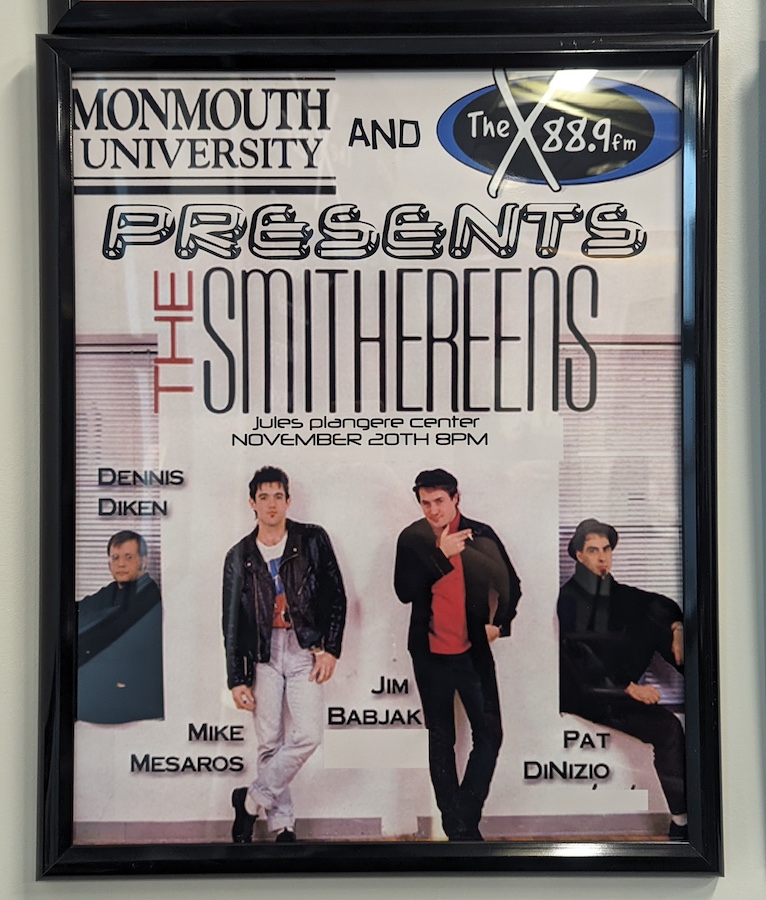
As a 30-something person who works in radio, Marden says the future is looking just fine.
People have been saying radio is dying since I left school, before I left school. I watched them put a brand new computer lab in right next to the X for podcasting, and we were just starting to talk about podcasts when I was leaving. I’m like, ‘Man, I wish I had that while I was there,’ but that’s the beauty of radio. I graduated in 2011 and here I am in 2024. It really is the strongest medium for people to get information to be entertained.
Locally, when you think about [Hurricane] Sandy when we had no power, we were in our houses and we had to go into our cars to charge our phones because our phones would die. You’d sit there and listen to the radio. You’d sit there and listen to AM radio and get all the information to be updated. There were so many people just waiting to hear their town hopefully being the next one to get power back. It kind of smacked people in face when TV was gone and other mediums were gone that the radio still existed, and the radio will always exist in some form.
People were worried about satellite radio. People now worry about podcasts. When we had the COVID-19 pandemic, people sat there and realized what Twitch was and what YouTube TV was. All of these streamers were kids that were playing video games and then making their own talk shows and podcasts. iHeart says they are number one for podcasts for many reasons: We have amazing programming. We also have 10 million podcasts. If you want a podcast, iHeart will give you one. I swear to God, they’ll give you a platform for it just because you said you want one, which is great, but that’s how radio will evolve.
It’s almost bringing WMCX into the corporate world with learning by trial, by fire, with podcasts. The cool thing about radio and what I’ve learned with the people that I have worked with (because now I worked with Jim Kerr, celebrating 50 years waking up New York City) is: Why has he survived this long, when other people haven’t? And, listen, I love doing the wacky, entertaining, funny, make-you-laugh morning show as much as the next guy, but he doesn’t try to force the entertainment on anybody. He believes radio is your friend and that’s how he looks at it when he wakes up in the morning. He looks at it as, ‘I get to go talk to my friends,’ even though he’s probably never physically met them or anything like that. That’s how he looks at the radio. Then when he’s on vacation, he misses having those conversations with his friends, just like when you haven’t seen a friend in a while and you want to catch up. You missed that friend, and that’s how he looks at radio. I think that’s how his listeners look at him, too.
When I took that philosophy with me, I kind of found the same thing like, ‘Oh, I want to talk about this on the radio,’ and you wonder how people were going to react. you get to the point where you’re like, ‘Well, it kind of matters to me, and if it matters to me, it matters to someone else out there,’ so as long as you feel like you’re talking to that one person, then you’re fine. Radio will always evolve; whether it evolves into ‘We no longer use AM anymore,’ and because people want to get that out of cars one day, it no longer be FM, but then Wi-Fi will be in there; there will always be some form of radio. The term radio will evolve. It might not be the traditional way our parents use it, but everything evolves.
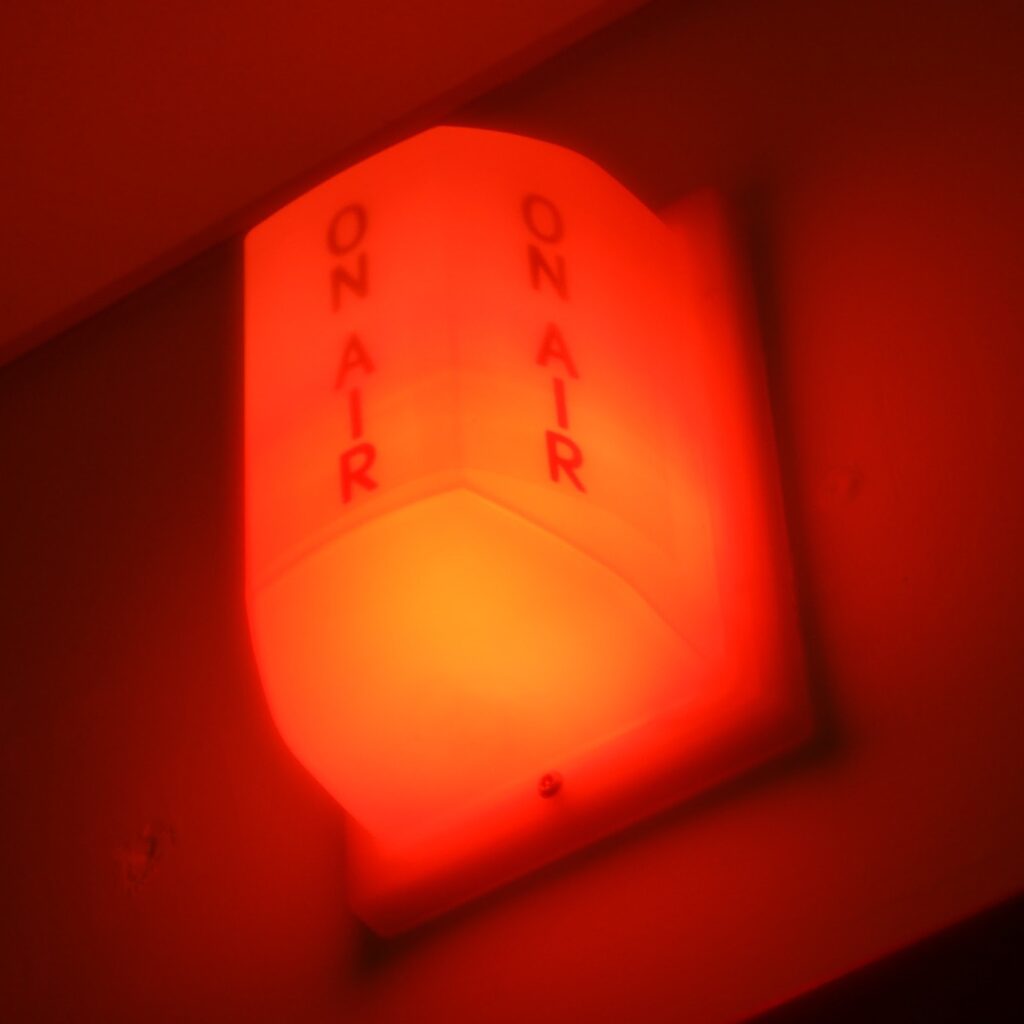
E-board, AIM, & hair metal
If everything evolves, it’s important to keep look back and see where we’ve come from. On-Air Host/Producer of “Jersey Rock” on WRAT 95.9, Events & Marketing Manager at the Red Bank RiverCenter, and certified multi-hyphenate X’er Tom Hanley, Class of 2004, accomplished quite a bit in their years at WMCX, including an eighties’ hair metal show, elevating the news program, and celebrating other WMCX anniversaries preceding this one.
I hosted The Night-Train, ‘the only place for eighties’ hair metal with an Edge on the Jersey Shore!’ It was a Saturday night all-request program and I had a blast doing it. We took requests over the phone and via WMCXRequest on AOL Instant Messenger. I had some of the best listeners! Each week they would fill three whole hours with requests. My final show on May 13, 2006, ran about seven hours long because of that.
I became News Director in May of 2003 and held the position until May of 2006. During that time PR tasked me with taking the News Department to the next level by increasing our reporting of on-campus news and producing a weekly news program; the 30-minute WMCX News Show debuted in the Fall of 2003. We increased it to an hour-long weekly news magazine program and rebranded it as X-Factor in the Spring of 2004. We also created an annual live Election Night special. The first Election Factor covered a number of local races, as well as the 2004 Presidential Election. I completed 49 episodes of X-Factor before turning it over to incoming News Directors Sean Quinn and Jason Allentoff. understand the program ran for over a decade. It’s a testament to the incredible people who came after me. Sean Quinn in particular fostered a really amazing environment and culture. Each News Director paid it forward and the result was something truly special.
We celebrated WMCX’s 30th anniversary twice. The first was in May of 2004 with a week-long alumni on-air takeover. We organized a more formal celebration in the Spring of 2005 which also commemorated PR’s time as Faculty Advisor of WMCX. The surprise party was code-named ‘Operation Condor.’ We put it together in secret with leadership from future Faculty Advisor Professor Aaron Furgason and magnificent logistical support from Donna Mancini. Surprising PR with hundreds of former WMCX-ers is easily one of my fondest WMCX memories.
My time at WMCX is still with me. I’ll carry those moments forever. I look forward to more great WMCX moments because what PR started and what Furg is carrying forward is something truly exceptional. I’m where I am today because of The X 88.9.
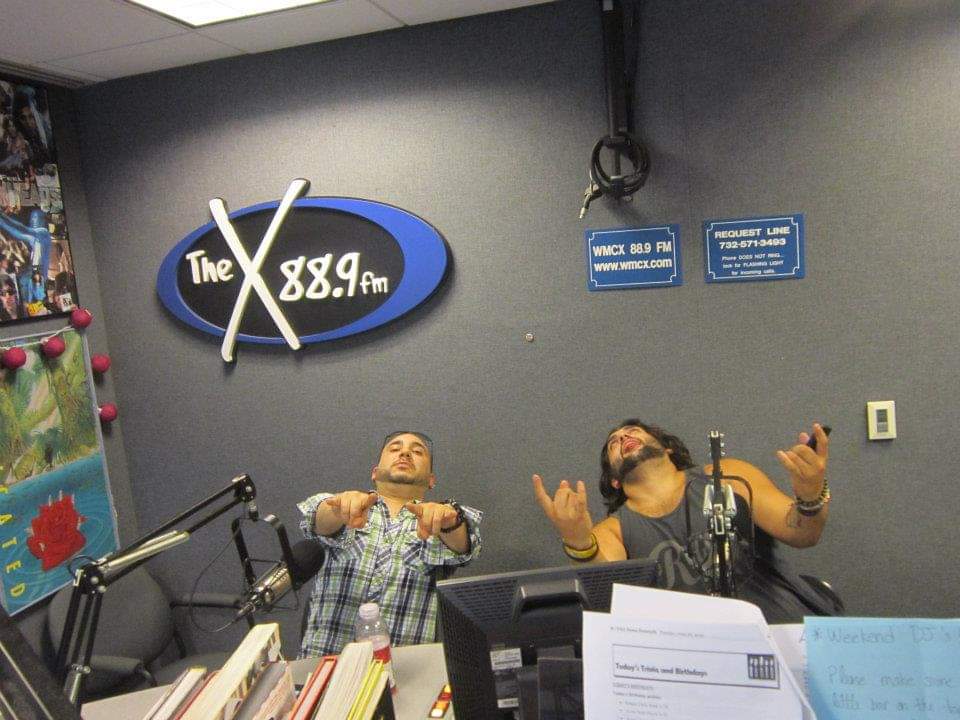
The college radio to record label pipeline
Many former X’ers will report a love of music and finding the station a way to connect with people, be social, and make oneself into a micro celebrity, or social influencer in a sense. Parents can watch on the in-studio feed, friends can listen in and call-in and make requests, and strangers listen to what you put on. Nicole Vitale, New Release Content at Warner Music Group and former production manager at 300 Ent, Ultra Records, and Megaforce (all record labels) found her experience at the X (“I made it my mission to become general manager when I was senior, and that’s kind of what I did!”) formative in their career breaking artists and new music, but not exactly in the says they expected.
I believe I was accepted [at Monmouth] by this time. We’re walking around, we’re taking a look, and this guy by comes out of the communication building, and he’s like, “’What do you want to do? What are your aspirations?’ His name was Joe Palmer, he was on the radio, and part of the news team. I said, ‘I want to be in the radio and television programming doing broadcasting things,’ so he brought me upstairs, put me on the air, and I was hooked.
You have to build a visual for someone because you’re on such a purely auditory medium, in order to like create something that people can kind of like see in their mind’s eye; you want to paint a picture, and I love telling a story.
But as I went into school, I was like, ‘I want to be on the news. I want to be a television news broadcaster,’ and then I kind of realized that I liked audio more than video. I came to a crossroads, because during my junior year as Music Director of the station, I was communicating with all these labels and their marketing companies and radio promo people trying to get spins, and recording those things for College Music Journal. When I was doing that, I was like, “This is really cool, because I could put a new song on the air and help be a part of what breaks it,” right? Then I was like, ‘Do I want to work in radio or do I work in music?’ It came to a point where I interned at a local, nationally-syndicated radio show and then I also interned at a music marketing company that was part of Sony Music called Red – now owned by The Orchard. I don’t think it exists anymore, but at that time I was like, ‘Well, this is really cool.’
I was very enchanted by the music industry. It was really elusive and it was very sexy, and really fun. I had a really good time, so I was like, ‘Where am I going to go with this?’ Being on the radio kind of helped me communicate better and be open to other opportunities, and while I did have fun being on the radio, I was kind of like, ‘I don’t know if it’s a direction I want to go in.’ Being exposed to how the music industry works in this tertiary sort of way made me crave going in that direction.
For Vitale, WMCX impacted their career more than they thought, and as a lot of things do in radio, the defining moments were a matter of what we call “luck,” or fate.
I did pursue a career in music industry, but it was actually the same day that I had an interview for a sales role at WRAT 95.9 that I definitely blew the interview. I don’t think it was on purpose, but the guy said to me, ‘Where do you see yourself in your career radio?’ And I was like, ‘Satellite,’ which is not something you say to commercial radio station when you’re being asked to sell airtime. I was like, ‘That’s it!’
Then, that day, literally 45 minutes later, I hopped on a train to Manhattan and I had an interview with an independent music record label called Megaforce and I got the job. I was like, ‘Well, this is it. I’m gonna start my career and see where it takes me.’ it was really interesting. I also worked part time at Press Communications doing promotions, and I was excited to be front-facing, giving out prizes and stuff. It wasn’t exactly what I wanted to do, when I finally decided to take that job at Megaforce. I do feel like the work that I did at the X (and being a Resident Assistant at Monmouth and dealing with different personalities) really did help me prepare for the fact that I was doing everything at this job – being an assistant and the right hand person to the CEO because it was a five person company. I’m doing that and doing royalty statements, but I remember my first time on the air without Joe, and I felt like it was trial by fire because I just got thrown into the booth and they just go, ‘OK, you press this button and that button, make sure that the faders are set. You’re not peaking.’
That’s how I felt like my first job in the industry was like, ‘I’m learning as I go here.’ That kind of paired me for the uncertainty that was the beginning of my career and subsequently now like having worked at four different labels.
College radio breaks bands in the music industry. They’re always going to be connected. As long as terrestrial and local and college radio is around there’s going to be a way for new and upcoming artists to get their stuff out there. Working at a major label and knowing what goes into the promotion break an artist, it’s so much more complicated and there’s so much more red tape, but also your budget is much larger and you know you have a promo person flying out to like, Boise, Idaho, or like hanging out with a radio promo guy in a strip club to get your record played sometimes.
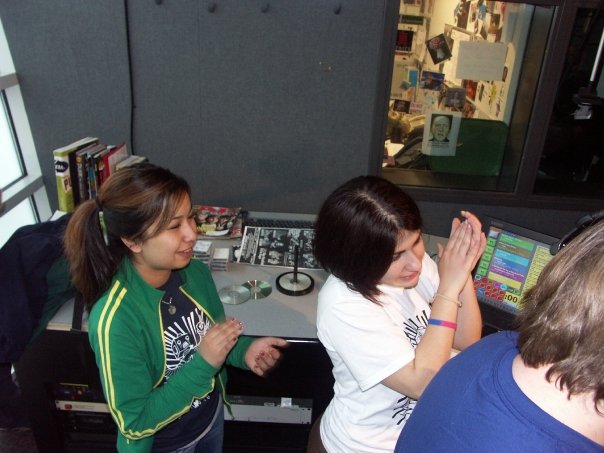
This is what you do: you schmooze. You spend money, you go to SiriusXM, you work them. You know, we want to get this money spent and local and independent bands don’t have that luxury. They have to start from the beginning and college radio is the beginning. It’s the way you can get an artist that’s playing all these little shows at Asbury Lanes that don’t yet have the resources, money, or connections. This gets their foot in the door and you never know who’s listening on the other end.
Coming from a lens of lens working at three independent labels, they all had the A&R’s out there scouting; they’re always trying to find the next big thing. College radio can sometimes be the way. You may not be able to go out to a show (especially during COVID, it was very difficult for radio promo people, A&R’s to do their job) and I think college radio is with those local independent artists that are really, really hungry and scrappy and ready to work hard to get their big break. I do know now, working at a major, it is very different. And I’ve been fortunate enough to have been on both sides of that industry to see like what it’s like to start with crumbs… then the whole pie, and now you’re creating a bakery.
I’m grateful for the opportunity that WMCX gave me, for all the people that I met, for all the experience that I gained; it also really helps that we have a really dedicated faculty and staff. I think college radio is so important and shouldn’t be discounted. I don’t want kids who are on the X get discouraged, because it is such a hard industry to break into, but I want to try to give back hand that raised me, and be a mentor if I can.
The college radio to science guy pipeline
Not everyone who had a radio show was a communications major or dreamed of a career on-the-air. Monmouth also happens to have an excellent science department, which Justin Hanenburg, today living in Los Angeles as product specialist doing on-site demonstrations, writing and working with laboratories to design the workflow and bring in the best new equipment, and continuing their education through a doctorate program, pursued with a major in Clinical Laboratory Sciences and minor in Chemistry.
WMCX was more of a personal hobby to continue my connection with music while pursuing a degree in science. Some of the things that I learned from the X was stuff like event planning, promotion, show running for places… not that we ourselves were doing it at The Stone Pony, but having to know certain cycles of certain things, right, concert tickets and everything. So being close to that and knowing where key players were and even Feeling like you have a small role in that.
If you go to The Stone Pony and discover a band, you’re then putting them onto your personal show to demonstrate, because that’s why people tune into you. If a young person wanting to be an A&R rep to send out and find that amazing music and discover it and send it out… Wait, so it was probably downloading a lot of illegal music through Limewire at the time, weren’t we all? But the ethical part of me was like, ‘Well, I’m going to get them 20 more followers into nuke and that’s 20 more seats and tickets sold to the next concert at a local venue down in Asbury Park’, so that was like my ethical way of getting around free albums.
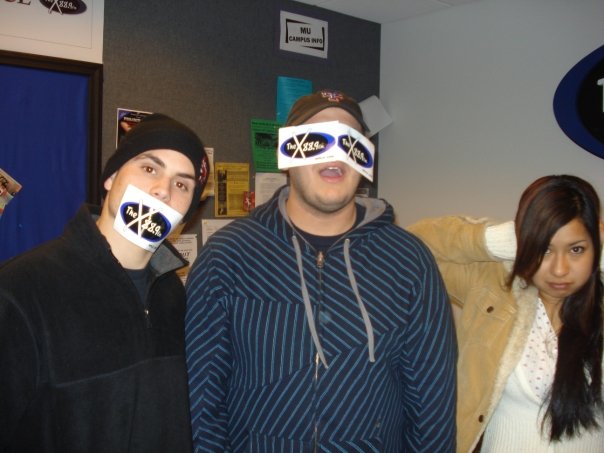
Going into my freshman year of college, Facebook was just then inviting college kids onto the platform, and Instagram wasn’t a thing, so most people my age were still tinkering around on MySpace and finding bands that way. Music discovery and falling into the idea of, “How do we bring this into more mainstream?” A wide consumption medium was radio, and so that was a lot of power that we had back then. Hanenberg had his own show, carrying on a tradition other X’ers in this piece began: heavy metal.
We did have a lot of power in that way, and it was very democratized in a certain sense because people tune into to various shows. We had the show that I was on was with Kevin Scally and Mike Bennett called the Last Revelation, Monday nights midnight to one. I remember playing black metal, death metal, and hardcore. Every so often I know there were things that we got away with just because it was such like low guttural screams. You couldn’t actually understand the lyrics, but we were always told like,’Hey, watch what you’re doing because there are Christians that like pay attention and they’re looking to steal this station.’ We had to be very careful about the language, and we always had that 10-second ‘Dump’ button there.
Something that I really enjoyed about it was, in a communication sense, creating storytelling for listeners using time and audio in a place where I can’t show you what I’m looking at. I think this was like the early days of podcasting for us because a lot of times it felt like hanging out with friends, but now we have to describe to the audience what it is that we are seeing or experiencing and using audio in that sense. And sometimes people talk about ‘radio land’ (this is a very divisive term, at least for us, in the station between for a few of us on describing listeners), but I really enjoyed that aspect of things of trying to create storytelling in this way.
The industry has certainly changed a bit from when we were at WMCX. “Face for radio” isn’t really a thing anymore as we have live video streams, and there are a lot of different jobs because of the podcasting, the streaming, the editing, the video aspect of it. At its core, what remains is the storytelling. Where are you and where are you reaching people? Can you connect with people you might not ever meet. Or, ones you will? Hanenberg pondered.
At times, we did get a chance to meet them – people on radio or on the other end, listening – whether it was that they were asking folks to call in a number or whatever for concert tickets. That is how we found out that the people who were listening to the show before us called it the Hostage Situation, which was hardcore and punk, and just decided to keep on listening into the next hour and then just found us!
There was a second show that I was a part of. [I] can’t remember the name of it, but it was a very early morning show, and meant to be just like, ‘We are going to make up weird conspiracy, and organize and build this thing.’ It was supposed to be a spoof show, but the purpose of it was if you were anybody tuning into it, you wouldn’t know. It was very well acted.
An example here would be we recorded our 111th episode at the Perkins in Neptune, New Jersey, so if you’re listening in, it sounds like there’s a party happening. We are on this, the highways right there, there are people going on, there are muffins and such ,and we had somebody else in the other room or some voice modulators, and we were working with various things and audio to create this immersive experience as you’re listening, so much so to the point that people were calling in and saying, ‘Hey, we’re at the Perkins and you’re not here,’ so we kind of had to scale it back or try to find ways… we realized we couldn’t be too.. something just had to make more sense.
Another episode was working with sounds, ideas of sounds, and playing with MIDI and other things was like a Halloween episode and having various people calling in to say that this is going to be the year that the zombies are taking over. We had an expert archaeologist calling out of Egypt, we have this reverend from the Bible Belt, and we were able to because Kevin was in such a mastermind that these kinds of things and was able to find the right kinds of tones or sounds or background music to make this immersive experience for a listener.
Also, I remember Senses Fail was there one time. To have such an intimate concert right of this live-streamed band is right there. Seeing the audio and video, people are next door in the other room, but we’re like 6 people in the audience just watching them and some of these are like personal friends, actually. What a unique experience.
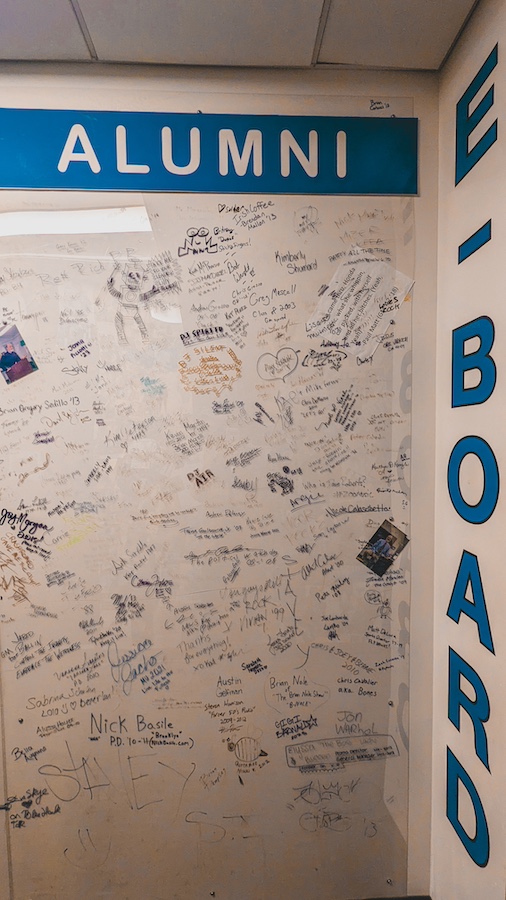
But again, Hanenberg is a clinical product specialist. While in an industry seemingly far removed from radio and media, they report great effects of WMCX on their career today.
I’m so glad we got to this point. Today, I get comments and compliments all the time on how I speak. When I’m on stage or giving a demonstration or presentation, ‘You’re so clear, you story-tell, you dictate, you take us through and away.’ And I’m like, ‘That’s because I was on the radio!’ It’s because I played music. It’s because I like to write. It’s because I’m not uncomfortable in front of a microphone. I still get the nerves. I still hate public speaking just as much as everybody else, but I have a certain comfort and a desire to be behind the microphone, and I think people really pick up on that, and especially when I started getting back into podcasting at a professional level.
I tried doing it on my own – one called Lab for Life. I did like three episodes, then I realized this is way too much work for one person and kind of dropped off. Then I did it for as a cohost for an organization called American Society for Clinical Laboratory Sciences. They have a podcast called Off the Bench and I was one of the cohosts with them for a while. We grew our listener base up to over 10,000 and we had over 10,000 plays within the first two years or so. I had to step away from that again, just with other responsibilities and such, but yeah, and this is where it’s like, frequently, ‘You’re so good at this,’ and, ‘I’ve been doing it before! I had been coached by people pursuing graduate education in this area.’ Again, it was a personal love for being behind the microphone, either in radio or music, etc.
Figuring out what kind of voice that you have
Not everyone ends up in a career through their major, myself at the top of that list. Austin Gelfman, Class of 2011, also lives in Los Angeles and is an actor (see them in Lilyhammer!), writer, and film set rigger who majored in Radio Broadcasting, which they claim they haven’t really used but I think is related.
It taught me awareness of cameras and such. The reason I got into radio in general was because I just liked sound. That is, messing with sound, creating stuff, and the thing that I wanted to do was just great, silly, ridiculous things that made me laugh. I ended up doing that as Production Director for a year, working in that last room where they had all the sound editing stuff. I made like station ID’s and all that – that was probably my favorite gig.
After that I was Music Director for like half a year… I probably should have asked people for help, but I was just listening to a lot of stuff that I enjoyed. I don’t know how big my music taste is, but I think it’s pretty wide, and I started putting on some weird stuff. I remember I put Hot Chip on the program, and Hot Chip is great, but not necessarily an alternative rock group. I think the last thing I did was a brief stint as the Webmaster.
Going back to relationships and connections WMCX college radio helped create a lot of those, in support of careers, friendship, support, and all the above.
I think that just having one or two good people at any kind of media outlet makes an experience worthwhile. If you give someone in college a means to be artistic and create and have fun doing the things that they feel connected to and can naturally do, it opens a lot of doors and for a lot of creativity down the line. Professor Claude Taylor, while working with WMC X and in his class, I ended up formulating a story that I’m working on now. That’s like kind of an epic I’ve been thinking about since 2010. I’ve been thinking about it since 2010 and I wouldn’t have had like those thoughts or those stories if I wasn’t meeting these people and being creative with them, making sounds and weird noises with my voice.
I can’t remember his name, but he passed away a few years ago – the guy that was angry all the time and he had his assistant, who had like, the longer hair in the back, business-up-front-party-in-the-back hair. I can’t remember their names, but I had this viewing thing from a class that had a weird bunny thing, and an octopus that were just talking about movies. It’s weird and stupid, but it was also awesome and opened the door for me. Creativity, create, create creatively. I’m going to credit all my continued involvement to Alyssa Koulopooulos (Silverston). They were the person that sat there with me and said, ‘Let’s keep you in this.’
I met Joe Palmer, Sean Quinn, [the late] Matt Zorner, and Peter Tortolucci at an event. They had the WMCX table and they won me over. I joined the next day by walking in and heading straight to the E-Board office. Donna Mancini had to politely tell me that the computer was only for the E-Board.
Keeping it going
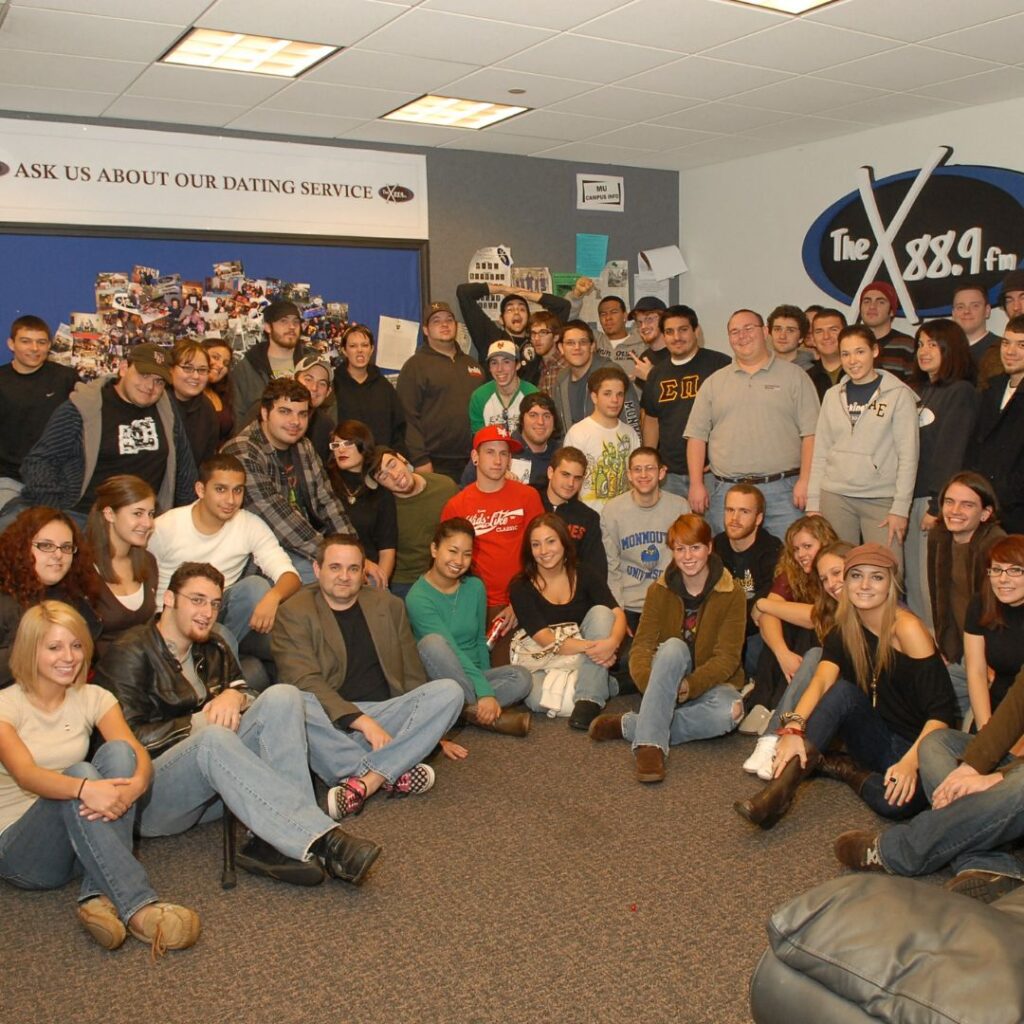
Alyssa Koulopoulos (Silverston) graduated in 2010 as a Communication Major and is a top performing insurance producer living in Massachusetts. They became the news director for a semester and “kicked ass bringing the local news (some gossip news too. This was 2008 Britney Spears era),” after MU Iworking in radio promotion and A&R in the music industry.
I got my dream internship at Sony Music around the time the new e-board was elected and was able to onboard talent from WMCX into the music industry. I left the music industry once I realized it was more of a business. Those X’ers who I was able to help get an internship at Sony, are now in big roles in the industry. Without WMCX, I don’t think I would have been able to accomplish any of that. During my internship at Sony, I helped create a College Radio Marketing Campaign where we targeted certain college radio stations for certain bands. I was able to use WMCX as a prototype for that. It was wild at the time. I still am in touch with a few of my close friends from the X. I am very proud of what we accomplished.
And some of their most memorable experiences?
Post-grad life, I tell it my clients, colleagues and networking partners this story. Jim Bruer [of SNL fame] was coming to the University for a comedy show. Us as the News Team were able to secure an interview with him. It was me and Pete, Joe Palmer was supposed to do something with the board. I can’t remember what, but he was late. Jim called in on time and Pete accidentally patched him through to me and he started introducing himself. I told him ‘I’m sorry Mr. Bruer, give us a second. We are waiting on Joe Palmer to get the board ready,’ or something like that. Without missing a beat he says, ‘Fucking Joe Palmer.’ Pete lost it and I had to hold it together. That was our tag line for the rest of the semester: ‘Fucking Joe Palmer.’ I still use that today when something goes wrong. This is how it impacted my post grad life – I still say ‘Fucking Joe Palmer’ to this day.
Plus, Election Factor when Obama was elected (I can still hear the chant ‘My president is Black’), watching Quinn, Pete, and Zorner create, War of the Worlds. Who can forget Fudgey the Whale for Furg?
A full circle moment
I always was transfixed by radio. I wanted to work… one of my dream jobs was to work at either Z100 or I wanted to be a VJ on MTV, so those are like my top two choices.
Jenine Laviola (Clancy, which I maintain is such a great broadcast name) graduated in 2009 with major in communications and concentration and radio and television.
In my first year at Monmouth [after doing the extended program at Brookdale], I was the News Director at the radio station in charge of helping to put together and leading X Factor, which was our weekly news show. I particularly produced the news music package and the entertainment package – that was something that I was passionate about. Then, in my second year, I stepped into a role that was created, I think, for one other person prior to me, and it was basically a way to kind of like step back from the news, but also like take a leadership role and do other like big events, the live broadcast from the [now-closed, R.I.P] Inkwell where we had musicians perform full time with live performances.
Memorable projects included interview work with many musical acts.
I got to interview Billy Bragg, who was a musician from more of the like maybe late eighties like into the nineties. He was British and he definitely was more politically bent, like he had a lot of political songs, and I’m sure he’s still doing probably amazing work.
I got to interview The Watson Twins, which I’m still like fangirling about because just from our generation and being big fans of Jenny Lewis, you know, former lead singer of Rily Kiley and her solo stuff at the time, so this was 2009. This was only two years after Rabbit Fur Coat had come out. It was a really big album and a really big deal that The Watson Twins were kind of doing their solo thing. So for me, I was like, ‘Oh my God, this is like a dream!’
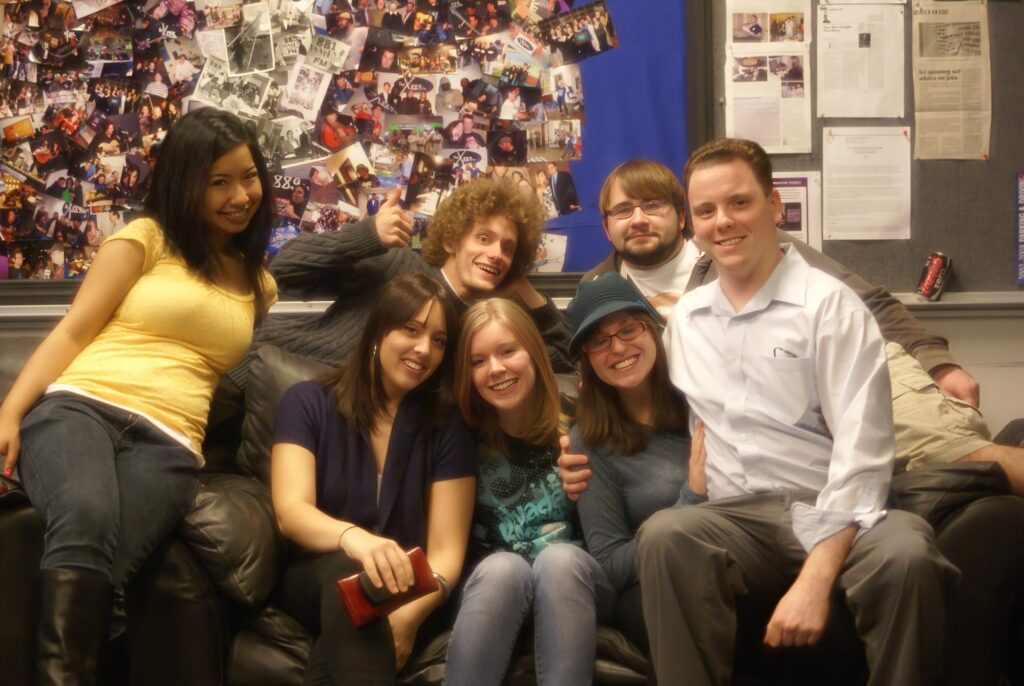
I also got to interview one of the band mates from Semisonic, Jacob Slichter, who wrote that book, So You Wanna Be a Rock & Roll Star. It’s somewhere on our bookshelf, but Furg had recommended it at the time. I think that’s how I got the connection, because Furg knew him from all of his connections at Atlantic.
Those where the main things I had done and something I do want to also stress is while I was News Director, one of my goals was to combine the efforts of the radio station, TV department and newspaper outlet. Those were the three that I wanted to incorporate together, which is what we successfully did when we broadcasted the 2008 live election results.
As the news director of X Factor, Laviola lead the live broadcasted Election Factor, which that year announce the election of the United States’ first Black president including live telecast from the NJ Democratic Headquarters in New Brunswick. “My president is Black” was a real chant accompanied by joyful clanking of pots and pans flooding the streets.
Being able to broadcast the live results of the 2008 election of Barack Obama was a huge deal because, on a personal note, it put my goal together of combining all three media outlets; I got really excited about having the chance to do that. Tom Hanley was an inspiration for that. He kind of gave me the pathway to be able to be like, ‘Oh, this is something that we could do because that was something he had done on a more consistent basis than I did,’ but I thought if there’s going to be a way to bring this all about, why don’t we do it for a big event?
Putting that all together and having everybody all take part in that, I think it was this magical moment because we were all working together, and then coinciding with that was the more cultural importance of that this was going to be a historic moment. This was our first Black president, so that was why this was a huge deal. It felt like all of these years of hope that was put into our generation specifically was like coming to fruition.
At that time, we’re watching history in the making, and I will say that something that is stuck with me to this day is that Professor Scott, who was at the time one of the leaders at Hawk TV, said, ‘Be present in this moment, because you were watching history happen right now.’ Like, history isn’t something that happened to you prior, it’s not something that’s happening in the future. This is now. It was like the first time at age 22/23, where it was framed that way to me that I was like, ‘Oh my God, we are witnessing history happen.’
Post-grad, they got a job right out of college in the news business, in their last semester in Monmouth interning for Fox News Radio doing what they were did at WMCX, putting together news packages, getting money quotes and sound bites to make compelling like good story and starting to put some things together for podcasts. In 2009, this was the beginnings of podcasting, and they were hired as the first freelance Production Assistant for Fox News Radio in a role created for them.
What a blessing, but at the time, I really wanted to be on air and I was a little impatient about it. I did get a job downstairs, literally. When I say downstairs, I mean in the basement at the News Corp building at Fox, and I was at Fox News and worked in television then as a production assistant. I left in my mid-twenties and I got off of a path that I didn’t realize until about a decade later.
Because I didn’t come from much and I didn’t come from money, I didn’t have connections. My whole social capital came from going to Monmouth, so to leave that… I didn’t know how long it would take me to get back on that track. Then I started working in craft beer and it had the beginnings of something really cool happening, like a community was forming. It was like this golden era, similar to when when I was at the X. I did that for about five years, but I took journalism with me. When I work in sales or worked in sales, when I talk to people, it was me still asking the questions, me still wanting to hear their story. Then I transferred into the tech industry in 2022 as a customer marketer for about nine months in my previous company. Unfortunately I was laid off during that time, but got back into it in my current role [at iCIMS], which basically is a perfect combination sales and marketing experience with my journalism experience. I get to interview happy customers!
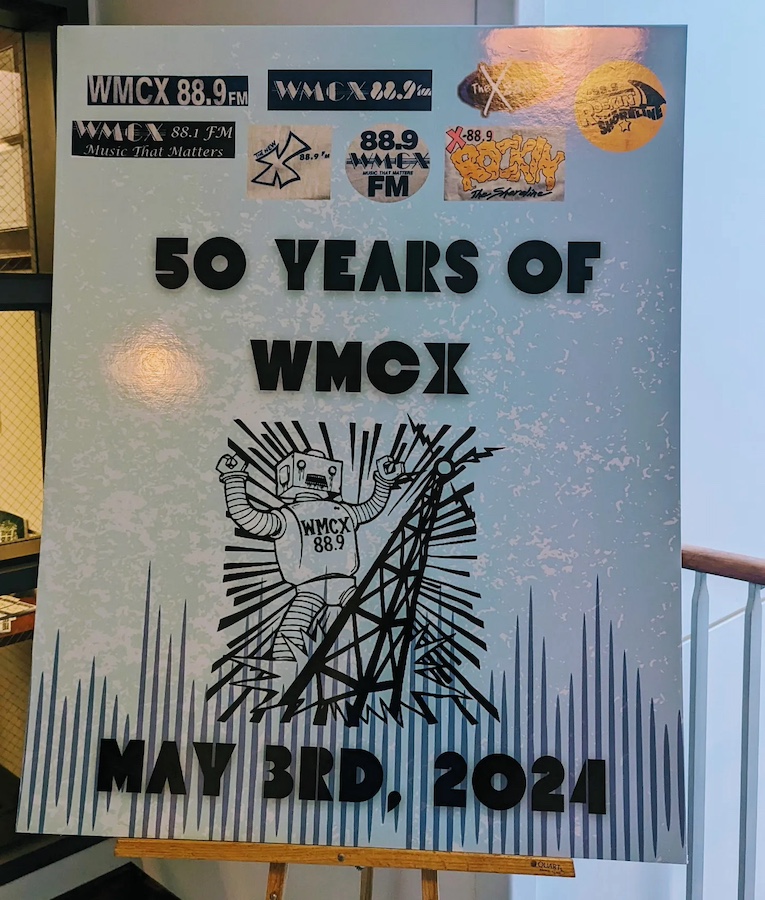
In a way, many X’ers are on the same track. There’s a through-line with everyone’s story. The comfort talking to people, curiosity, finding a way to distill large ideas into something succinct that could told to other people. The challenge with any business, I think, is making people care. I think working at WMCX has helped all of us in this way, regardless of industry.
I think for a long time, I was shaming myself that I didn’t continue with what I went to school for and was self-sabotaging with that was the narrative I gave myself, but to exactly what you said, those were key things: curiosity, wanting to still ask the right questions and get to know people like that was, again, taking these big ideas and framing it a certain way to kind of go from the macro to the micro. That was exactly what I’m doing now! It did stay with me the whole time, but, again, I just framed it a certain way to myself. I’m glad to hear that other people are kind of all on the same page, even though we ended up in different places.
Radio rockstar repping the X
Nicole “Nikki” Walsh (Reed) works at Google overseeing relationships and solutions for the ChromeOS and Chrome browser and was quite involved with WMCX, working their way up from Disc Jockey / Member, to Sales Director (2006-2007) and finally elected as General Manager, WMCX 88.9FM (2007-2008).
WMCX called to me like a siren song, a school club centered around the love of music too good to resist. Stepping into the station lobby felt like coming home. It was a place where kindred spirits, all a little quirky in our own ways, gathered with a shared love for music. It’s easy to feel like an outsider as a freshman, especially at a school where athletics and Greek life dominate. If that’s not your scene, the contrast can be jarring.
Freshman year, track practice clashed with meetings, but Pete Lepore, an exec. board member, saw potential and took me under his wing to help me get involved in the station.
They also dabbled in News Anchoring and Reporting throughout the years, but found a sweet spot in event production, sponsorships, and overall management, also booking shows at The Stone Pony, producing charity benefit shows Creative Couture and the Rock for Relief, Hurricane Katrina Benefit Concert, and unleashing the heaviest hardcore and death metal on the NJ airwaves as the “Vicious Vixens” with co-star Jessica Cortese (Quinzello). Additionally, through Hawk TV and National Broadcasting Society, they produced and filmed two documentaries, one for the LADACIN Network, a non-profit agency to which won a National Grand Prize award from the National Broadcasting Society (2007), and one to document the gentrification of Asbury Park, NJ (2007), and National Grand Prize award from the National Broadcasting Society (2008) for an audio comedy segment they wrote, produced and voiced over titled “Milk & Cookies.”
My years at WMCX were instrumental in shaping my career. Sure, the technical aspects were invaluable, but the true gift was real-world experience: from managing a business to leading a team of diverse personalities, I learned to navigate complex priorities and chart a course for the station. My time as General Manager taught me transferable business skills that have served me incredibly well. It opened the door to a life-changing opportunity – a John Bayliss Foundation internship and scholarship. Professor Dr. Aaron Furgason’s support was instrumental in securing this chance to intern at WOR 710 AM Radio, a leading AM News Talk station in New York City. This, in turn, directly led to a full-time job offer upon my graduation from Monmouth in 2008.
My career journey led me from radio to tech, but the skills I honed at WMCX still serve me at Google today. Program management, live event production, joint partnerships, even hosting live webinars – my radio experience laid the groundwork for all of it!
If you visit the WMCX studios, you’ll find one of Walsh’s most lasting contributions.
Furg and I couldn’t stand the blank canvas of the station hallway. It screamed for a makeover! So, fueled by summer boredom and a shared love for music, we spent weeks “decorating” – or should I say, transforming – the space from floor to ceiling. A glorious mess of album covers, band pictures, records, and posters plastered the walls. Once our musical mural was finished, Furg ensured its preservation by topping it off with a layer of plexiglass.
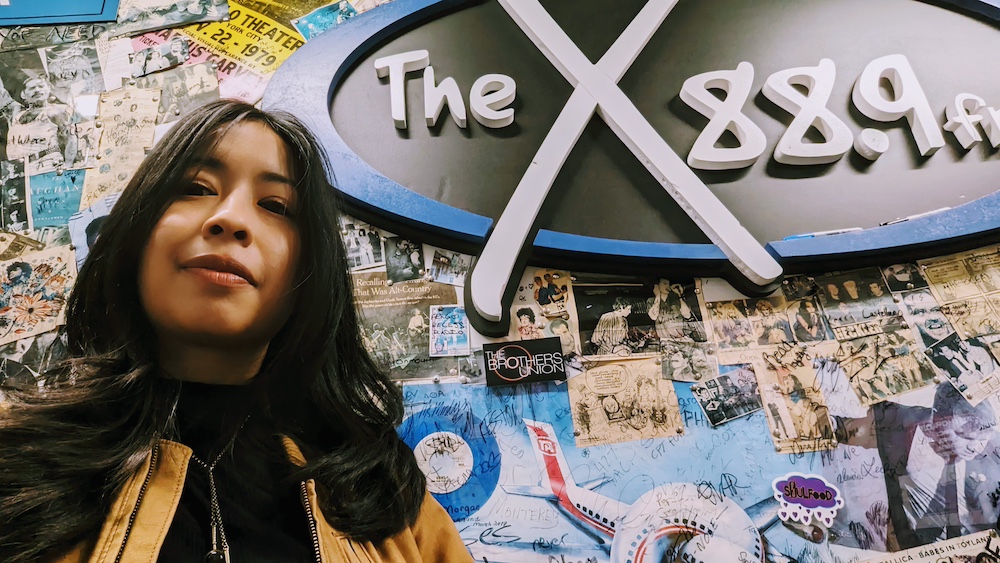
Dominoes falling in the right direction(s)
Mike Hildebrandt had a radio internship prior to coming to Monmouth University around 2010, which led to a part time job with the radio station and then a full-time job while still doing classes. Dominos falling backwards while still somehow blowing forward – instead of the traditional get to your senior year, get the internship, get the entry level, when they graduated, they were already working, “which is also why it took me up to eight years to finish going to school full time, then having to go right back the part time status, plus having a family, getting married, and having kids,” [Laughs].
At WMCX I was the Program Director and continued few years after graduation as an alumni on the air. I kept the show going and it was just a lot of fun… right now I am at New Jersey 101.5 WKXW and have been there for a good number of years, and currently Digital Content Contributor. My main day-to-day job is really pretty simple and I feel fortunate to have it: It’s writing content for the websites, up to three lifestyle pieces a day.
The more mainstay, which was part time and is now part of my full time, is my Sunday morning show, which I which I’ve been hosting since the Sunday morning person left in the beginning of 2021. Literally, she did one shift and then was done when 2021 started, so I’m very fortunate I get to be on air. I get to have some fun and I kind of get the right content on my own time, so to speak, and post it to the website. Going in reverse and saying with 101.5 with history and some other hats, I’ll do talk show production, board hopping; I’ve helped out with taking the board on podcast events for the talk hosts, and I’ve even assisted with liner writing and script writing for what you hear on the air, which is pretty cool.
Stepping in reverse prior to that, I was in a traffic role which was commercials and more with corporate, scheduling commercials for the entire enterprise. Commercial scheduling logs is when you hear the advertising on the air (a very behind the scenes role, like the oil that keeps the machine running that nobody thinks about, but everybody blames the moment something goes wrong, even if you had nothing to do with it). It was a very thankless role, which I’m happy I did because it really helps you see the full operation from conception to the actual on-air product. I did that for a good number of years at Townsquare, but it was also a separate full time job because it was with corporate. Like I said, I was one of the very rare movements going from corporate back down to a local level while moving up.
Prior to 2019, for a couple of years from August 2016 to March 2019, I was at Press Communications, a competitor where I started doing traffic. I was not on the air there because they were very big about me not doing multiple roles, whereas most media companies are open to that. They were more in the minority there, but Townsquare whereas is very open to that and, interestingly, I didn’t apply for the job at 101.5. They created it and presented it to me. That change over occurred in September of last year.
While at WMCX as Program Director, Hildebrandt won an award for their year, the Management Excellence Award, and would go on to receive the Contributor of the Quarter Award at 101.5 and shortly after, the full-time role.
This is what I mean by my dominoes following so many different directions – it’s hard to keep up, but it’s so untraditional the way it happened for me. You know, things happen for a reason, a certain when I guess I was meant to be in the world of chaos.

Smoke Signals: A different form of communication
And rounding out a Baker’s Dozen is me, who is today writing an article for The Aquarian about the experiences that ruined their plans for law school as MU Political Science major who took the LSAT twice (Karen Carson also noted ruined plans and was going to be a Pharmacist), but found themselves attracted by the quest for connection and the challenges of communication.
I’ll always remember 8:00 a.m. mornings in the white sky fog of early fall at the Jersey Shore. My variety and talk show, Smoke Signals, brought on philosophical interviews and unsigned bands, including a special post-grad summer when I brought in EDM producers live mixing on the air, and my reporting work for X-Factor, which included news packages on credit card debt and being one of the reporters on the ground at the NJ Dem HQ the right Obama was elected, which won an award for Outstanding Contribution to Student Broadcasting from the Comms department as a non-comm major.
After some reflection, time, distance, career way-finding, and lot of learning, I’m thrilled to return to Monmouth University to celebrate 50 years of the station that changed my life, bristling with gratitude and excitement to see everyone, and rock on.
Thank you.


